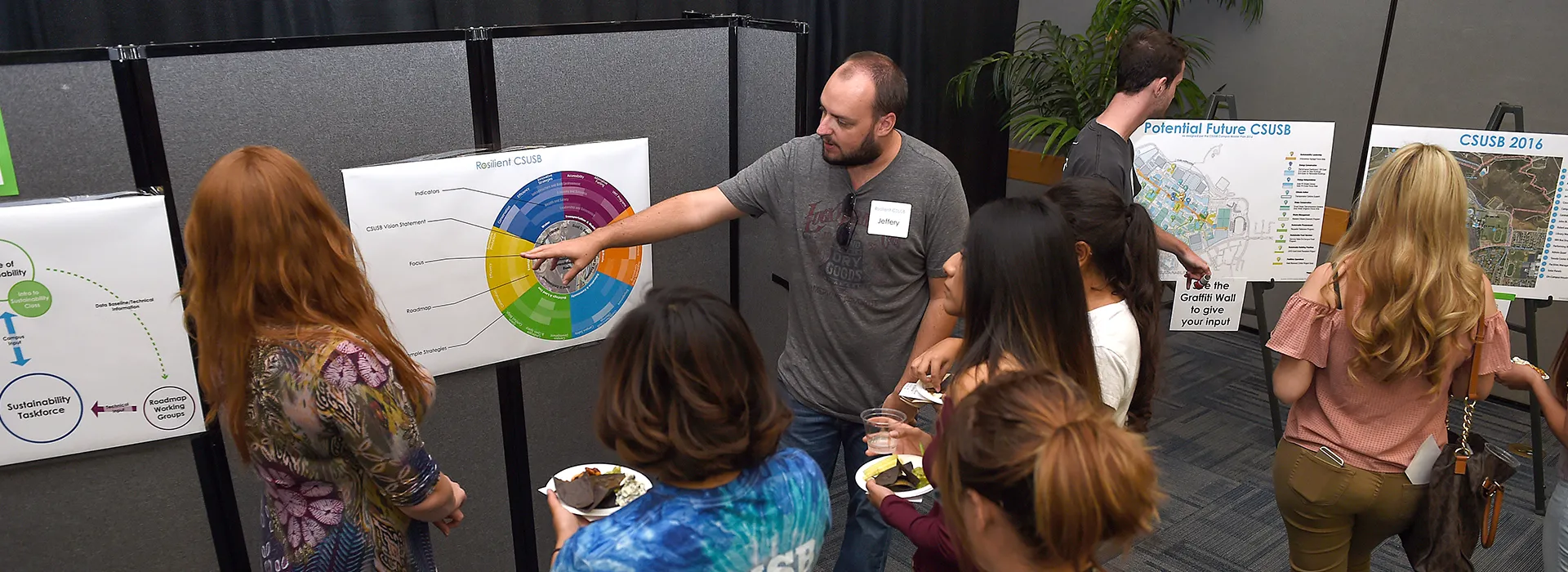Joe Gutierrez Office of Strategic Communication (909) 537-5007 joeg@csusb.edu

Cal State San Bernardino has released a draft of its Resilient CSUSB Sustainability Plan, a guideline for building, operating and nurturing a healthier, more resilient community for the San Bernardino and Palm Desert campuses to reduce the university’s carbon footprint.
The plan from the university’s Office of Sustainability is part of a commitment by CSUSB President Tomás D. Morales to deal with climate change and how it will affect the university, its students, faculty and staff, and surrounding communities.
Last December, Morales signed the President’s Climate Leadership Commitments, a signature program of Second Nature, a nonprofit organization committed to accelerating climate action in and through higher education. The university joined more than 600 other universities around the country as part of a nationwide commitment to deal with climate change.
“Signing the President’s Climate Leadership Commitments pledge is part of our ongoing efforts in sustainability to reduce the university’s carbon footprint here and in Palm Desert,” Morales said. “But CSUSB is taking a broader more holistic approach that considers three elements in dealing with climate change: the economic, environmental and social impacts of university activities.”
Under the pledge, CSUSB will concentrate on the Resilience Commitment focusing on climate adaption and community capacity-building to deal with a changing climate and resulting extremes, said Miguel Martin, interim energy and sustainability manager of the CSUSB Office of Sustainability.
The plan’s goal is to provide a framework for the CSUSB community to not only consider the impacts of university activities, but to also offer guidance for how the university can evolve in the face of emerging challenges.
The plan was presented to the CSUSB community in the fall of 2017 to gain input from students, faculty and staff. Using a collaborative, community-based approach, the plan was expanded to include initiatives set forth in the Second Nature Resilience commitment signed by Morales.
Under the plan the university created six working groups each focusing on a discipline (Energy, Water, Food & Waste, Buildings & Land Use, Education & Community, and Transportation & Mobility). Each group is comprised of students, faculty, staff, alumni and local community members.
Along with the groups, there are two taskforce committees that review the progress of each group. One committee focuses on the San Bernardino campus and the other on the Palm Desert Campus. The committees then report their findings and recommendations to designated decision makers, including Morales.
Martin said the Office of Sustainability works with the six groups and the two task forces to ensure that each recommendation aligns with the CSUSB Strategic Plan, the Second Nature Commitment and CSU system-wide policies.
The Office of Sustainability was created in April 2017 as part of the university’s commitment toward fostering a more sustainable future.
About Second Nature
Second Nature works to proactively build a sustainable and positive global future through initiating bold commitments, scaling successful actions, and accelerating innovative solutions among leadership networks in higher education. The Climate Leadership Commitments are a signature program of Second Nature and include a Carbon Commitment (focused on reducing greenhouse gas emissions), a Resilience Commitment (focused on climate adaptation and building community capacity), and a Climate Commitment that integrates both. The Climate Leadership Network comprises more than 600 colleges and universities in every state and the District of Columbia who have committed to take action on climate and prepare students through research and education to solve the challenges of the 21st century. Learn more at secondnature.org.
Second Nature is committed to accelerating climate action in, and through, higher education. We do this by mobilizing a diverse array of higher education institutions to act on bold climate commitments, to scale campus climate initiatives, and to create innovative climate solutions. We align, amplify and bridge the sector’s efforts with other global leaders to advance urgent climate priorities.
For more information, and to view and download a copy of the Resilient CSUSB Sustainability Plan, visit the university’s Office of Sustainability website.